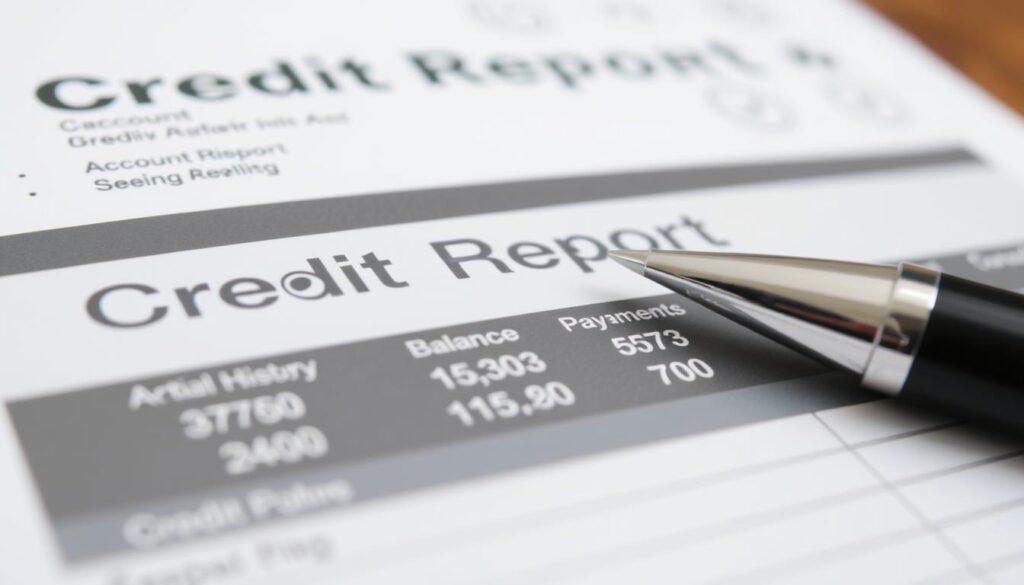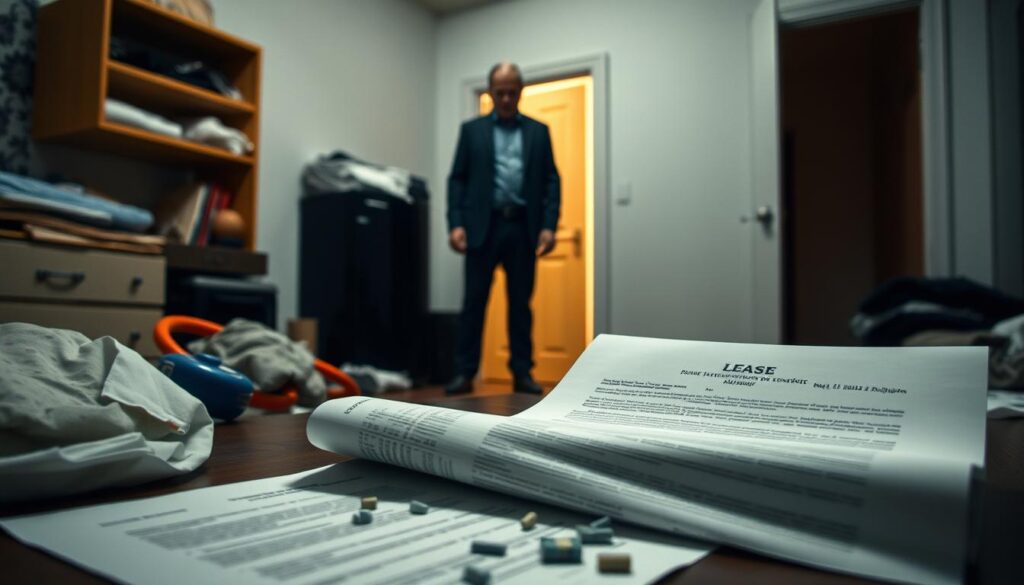An eviction on your credit report can harm your future housing options. It may also affect your loan applications and job prospects. But don’t worry! You can remove an eviction from your credit report.
With the right approach, you can take control of your financial future. This guide will show you how to effectively tackle this challenge.
Key Takeaways
- Understand the impact of evictions on your credit score and rental prospects
- Learn how to dispute inaccurate eviction records with credit bureaus
- Discover effective strategies for negotiating with former landlords
- Explore the benefits of utilizing credit repair services
- Familiarize yourself with your rights under the Fair Credit Reporting Act
- Develop responsible credit habits to rebuild your credit after an eviction
- Prevent future evictions by maintaining a positive tenant-landlord relationship
Understanding Eviction Records and Credit Reports
Eviction records and credit reports can greatly affect your life. They play a crucial role in housing and financial matters. Knowing how they relate is key for maintaining good financial health.
What is an Eviction Record?
An eviction record documents a tenant’s court-ordered removal from a rental property. It’s created when a tenant doesn’t pay rent or breaks lease terms. Courts keep these records, which landlords and lenders can access through tenant screening reports.
How Evictions Affect Your Credit Score
An eviction record can harm your credit history and score for up to seven years. Major credit bureaus often report evictions. This can make getting new housing, loans, or credit cards difficult.
Landlords and lenders may see an eviction as a sign of financial instability. The Fair Credit Reporting Act (FCRA) governs how eviction records are reported and used. Knowing your FCRA rights helps when trying to remove an eviction from your credit report.
| Impact of Eviction on Credit Score | Duration of Eviction on Credit Report |
|---|---|
| Significant negative impact, often leading to a drop of 100 points or more | Up to 7 years |
The Importance of Removing Eviction from Credit Report
An eviction record on your credit report can hinder your rental prospects and credit repair efforts. Removing this blemish is vital for regaining financial stability. It can help you move forward and improve your overall credit history.
Eliminating an eviction from your credit report boosts your chances of securing quality rental housing. Landlords often check credit reports when evaluating potential tenants. A clean record increases your approval odds for desirable rental properties.
A clear credit report also aids in accessing various financial services. Lenders view those with eviction histories as high-risk borrowers. Removing this record can improve your credit repair efforts and overall credit history.
“Removing an eviction from your credit report can be a game-changer, unlocking doors to new opportunities and a fresh start.”
Clearing your credit report of an eviction can have a profound psychological impact. It provides a sense of closure and renewed confidence. This can lead to better financial decisions and control over your future.

Removing an eviction from your credit report is crucial for many reasons. It enhances rental prospects and improves access to financial services. Ultimately, it helps rebuild a strong credit history and opens doors to new opportunities.
Disputing Inaccurate Eviction Records
Inaccurate eviction records can harm your credit report and finances. The Fair Credit Reporting Act (FCRA) allows you to dispute these errors. You can remove these blemishes by gathering documents and filing a dispute.
Gathering Supporting Documentation
To start disputing, collect evidence that backs your case. This may include copies of your rental agreement or lease. Documents showing timely rent payments are also helpful.
Gather any correspondence with your former landlord about the eviction. Proof that the eviction was wrongful or inaccurate strengthens your case. Organizing this information will make your dispute more convincing.
Filing a Dispute with Credit Bureaus
After gathering documents, you can dispute with credit bureaus. The FCRA lets you ask bureaus to fix inaccuracies on your report. This process involves several steps.
First, contact each credit bureau individually. Submit your dispute in writing, by mail or online. Provide supporting documentation to back your claim.
Ask the bureau to investigate the disputed item. Request removal if it’s found inaccurate. Bureaus must investigate within 30 days and give you results.
Disputing eviction records can be tricky, but it’s crucial for your consumer rights. It helps maintain a healthy credit profile. Using the FCRA and being proactive can improve your financial outlook.
Negotiating with Your Former Landlord
Removing an eviction from your credit report is tough. Negotiating with your former landlord can help. This approach can improve your credit history and create new opportunities.
Requesting a Removal Letter
The key is getting a removal letter from your former landlord. This document states they agree to remove the eviction from your credit report.
To get this letter, follow these steps:
- Reach out to your former landlord and explain your situation. Emphasize your desire to resolve the landlord-tenant disputes and improve your credit repair efforts.
- Propose a mutually beneficial solution, such as paying any outstanding rent or fees. This demonstrates your commitment to resolving the issue.
- Negotiate the terms of the removal letter, ensuring that the landlord agrees to contact the credit bureaus and request the eviction record’s removal.
- Obtain the removal letter in writing, and keep a copy for your records.
Successful negotiation can be a game-changer. It can help remove eviction from credit report and rebuild your finances.

How to Remove Eviction from Credit Report
Removing an eviction from your credit report can be tough, but it’s possible. There are several ways to clear your credit history and boost your financial standing.
Disputing Inaccurate Eviction Records
If the eviction on your report is wrong, you can dispute it. Gather all relevant documents, like court records and rent receipts. Then, follow the credit bureau’s dispute process.
This usually means sending a written letter with supporting evidence. The credit bureaus are required to investigate your claim.
Negotiating with Your Former Landlord
You might be able to work things out with your ex-landlord. This could involve paying any overdue rent or fees. Ask for a written letter confirming the removal of the eviction record.
Utilizing Credit Repair Services
Credit repair services can help with eviction credit report removal. These experts know how to navigate the complex credit reporting system. They can spot errors and fight to clear the eviction record.
| Service | Description | Pricing |
|---|---|---|
| Credit Repair Consultants | Comprehensive credit repair services, including clearing eviction records and improving credit scores. | $99 – $199 per month |
| Lexington Law | Leading provider of credit repair services, specializing in credit repair services and legal assistance. | $89.95 – $129.95 per month |
| Sky Blue Credit | Affordable credit repair services with a focus on eviction credit report removal and credit score improvement. | $79 per month |
Removing an eviction from your credit report takes time and effort. But with these strategies, you can take steps to clear eviction records. This will help you rebuild your financial future.
Enlisting Help from Credit Repair Services
Removing an eviction from your credit report can be tough. Credit repair services can help. These professionals specialize in improving your credit history and credit score.
They review your credit report and spot errors. They guide you through disputes with credit bureaus. This helps if you’re unsure about the steps or need help gathering documents.
Credit repair services may negotiate with your former landlord. They can ask for a removal letter to help your credit score. This is useful if you’ve had trouble talking to the landlord.
Choose a reputable credit repair service with a good track record. Look for positive customer reviews. Avoid services promising unrealistic results or charging high fees.
Investing in a credit repair service can be smart. They can help improve your financial standing. With their expertise, you can work towards a better financial future.
“Removing an eviction from your credit report can be a game-changer in your financial life. With the right support, it’s a challenge that can be overcome.”
Understanding Your Rights Under the Fair Credit Reporting Act
Knowing your credit reporting rights is vital. The Fair Credit Reporting Act (FCRA) protects consumers. It governs credit information collection and use.
This law safeguards against unfair reporting practices. It sets limits on reporting certain information, including eviction records.
Limitations on Reporting Evictions
The FCRA guides credit reporting agencies on eviction record reporting. These agencies must follow specific rules.
Here are key limits on eviction reporting:
- Eviction records can only be reported for a maximum of 7 years from the date of the eviction filing.
- If an eviction case was dismissed or the tenant was found not guilty, the record must be removed from the consumer’s credit report.
- Inaccurate or incomplete eviction information must be corrected or deleted by the credit reporting agencies upon request.
These rights help consumers protect their credit. They can monitor reports and dispute wrong information.
Consumers can challenge outdated eviction data. This helps maintain fair creditworthiness assessments.
“The Fair Credit Reporting Act is a powerful tool that protects consumers from unfair credit reporting practices. Understanding your rights under this law can be crucial in removing unjust eviction records from your credit history.”
Rebuilding Your Credit After an Eviction
Recovering from an eviction is challenging, but not impossible. The key is adopting responsible credit repair habits. This approach can help rebuild your credit history and score.
By taking proactive steps, you can show lenders you’re trustworthy. This can help regain their confidence over time.
Responsible Credit Habits
Establishing good financial behavior is crucial after an eviction. It’s essential for improving your creditworthiness.
- Make all payments on time, even if they’re small. Consistent, on-time payments are vital for rebuilding your credit score.
- Reduce your debt by prioritizing payments. Create a debt repayment plan. Lowering your debt-to-income ratio can boost your credit history.
- Monitor your credit report regularly. Check for errors that may impact your credit score. Dispute any discrepancies promptly.
- Consider becoming an authorized user on someone’s credit card. This can help build your credit history and credit score over time.
- Explore secured credit cards as a way to rebuild credit. These require a refundable security deposit.
Consistently demonstrating responsible financial behavior can improve your credit. This paves the way for better financial opportunities in the future.

Preventing Future Evictions
A positive relationship with your landlord can prevent landlord-tenant disputes. It helps avoid evictions on your credit history. Address concerns and keep communication open for a smooth tenancy.
Strategies for Effective Communication
Regular check-ins with your landlord can resolve issues early. Try these strategies:
- Respond promptly to any inquiries or concerns from your landlord.
- Provide updates on any changes in your circumstances that may affect your ability to pay rent on time.
- Respectfully discuss any maintenance or repair needs, and work collaboratively to find a solution.
Timely Rent Payments
Paying rent on time is crucial for a good tenant-landlord relationship. Late payments can lead to disputes and evictions. Set up automatic payments or reminders to avoid missing due dates.
Addressing Concerns Before They Escalate
Address issues proactively with your landlord. This may involve:
- Scheduling a meeting to discuss the problem and explore potential solutions.
- Providing documentation or tenant screening reports to support your position, if necessary.
- Negotiating a reasonable compromise or payment plan to resolve the issue.
Open communication and cooperation can prevent small problems from becoming major disputes. This approach helps avoid evictions on your credit history.
Seeking Legal Assistance for Landlord-Tenant Disputes
Landlord-tenant disputes can be complex and challenging. Legal assistance can help protect your rights and credit history. It’s important to understand the benefits of working with a legal professional.
Disputes can arise from security deposit disagreements or property damage claims. An attorney can guide you through the legal landscape. They’ll review your case and advise on the best action.
Legal help provides a clearer picture of your options. This is crucial when dealing with inaccurate eviction records. It’s also helpful for resolving disputes with former landlords.
With expert guidance, you can make informed decisions. You’ll be better equipped to protect your credit and rental record. A legal professional can represent your interests in negotiations or court.

